C语言头文件
C语言头文件大全(free)
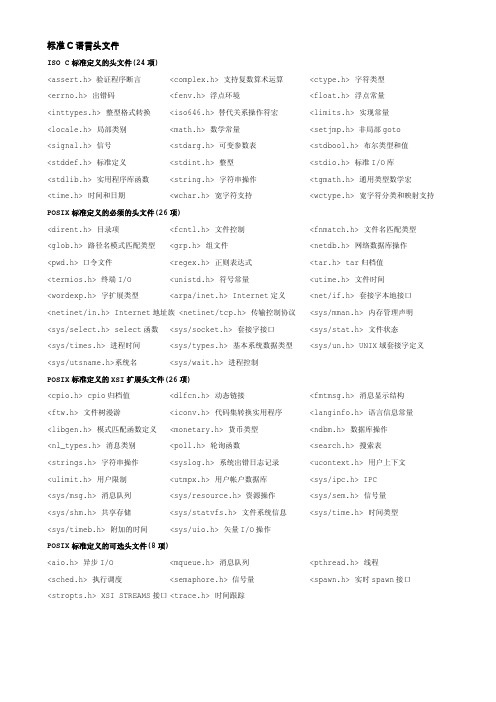
<bitset> -- for defining a template class that administers sets of bits
<complex> -- for defining a template class that supports complex arithmetic
<deque>
-- (STL) for defining a template class that implements a deque container
<exception> -- for defining several functions that control exception handling
<fstream> -- for defining several iostreams template classes that manipulate exteral files
defined
<iostream> -- for declaring the iostreams objects that manipulate the standard streams
<istream> -- for defining the template class that performs extractions
<slist>
The Standard C++ library consists of 51 required headers.This implementation also includes
three additional headers,<hash_map>,<hash_set>,and <slist>,not required by the C++ Standard,
C语言头文件大全

1 头文件ctype.h函数列表<>函数类别函数用途详细说明字符测试是否字母和数字isalnum是否字母isalpha是否控制字符iscntrl是否数字isdigit是否可显示字符(除空格外)isgraph是否可显示字符(包括空格)isprint是否既不是空格,又不是字母和数字的可显示字符ispunct是否空格isspace是否大写字母isupper是否16进制数字(0-9,A-F)字符isxdigit字符大小写转换函数转换为大写字母toupper转换为小写字母tolower地区化本类别的函数用于处理不同国家的语言差异。
2 头文件local.h函数列表函数类别函数用途详细说明地区控制地区设置setlocale数字格式约定查询国家的货币、日期、时间等的格式转换localeconv数学函数本分类给出了各种数学计算函数,必须提醒的是ANSI C标准中的数据格式并不符合IEEE754标准,一些C语言编译器却遵循IEEE754(例如frinklin C51) .3 头文件math.h函数列表函数类别函数用途详细说明错误条件处理定义域错误(函数的输入参数值不在规定的范围内)值域错误(函数的返回值不在规定的范围内)三角函数反余弦acos反正弦asin反正切atan反正切2 atan2余弦cos正弦sin正切tan双曲函数双曲余弦cosh双曲正弦sinh双曲正切tanh指数和对数指数函数exp指数分解函数frexp乘积指数函数fdexp自然对数log以10为底的对数log10浮点数分解函数modf幂函数幂函数pow平方根函数sqrt整数截断,绝对值和求余数函数求下限接近整数ceil绝对值fabs求上限接近整数floor求余数fmod本分类函数用于实现在不同底函数之间直接跳转代码。
4 头文件setjmp.h io.h函数列表函数类别函数用途详细说明保存调用环境setjmp恢复调用环境longjmp信号处理该分类函数用于处理那些在程序执行过程中发生例外的情况。
C语言头文件大全
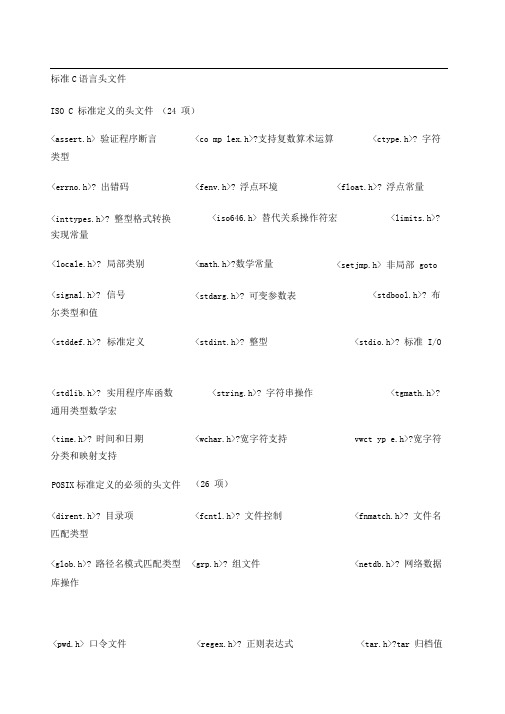
标准C语言头文件ISO C 标准定义的头文件(24 项)类型实现常量尔类型和值通用类型数学宏分类和映射支持匹配类型<glob.h>? 路径名模式匹配类型库操作<grp.h>? 组文件<netdb.h>? 网络数据<assert.h> 验证程序断言<co mp lex.h>?支持复数算术运算<ctype.h>? 字符<errno.h>? 出错码<fenv.h>? 浮点环境<float.h>? 浮点常量<inttypes.h>? 整型格式转换<iso646.h> 替代关系操作符宏<limits.h>? <locale.h>? 局部类别<math.h>?数学常量<setjmp.h> 非局部goto <signal.h>? 信号<stdarg.h>? 可变参数表<stdbool.h>? 布<stddef.h>? 标准定义<stdint.h>? 整型<stdio.h>? 标准I/O <stdlib.h>? 实用程序库函数<string.h>? 字符串操作<tgmath.h>? <time.h>? 时间和日期<wchar.h>?宽字符支持vwct yp e.h>?宽字符POSIX标准定义的必须的头文件(26 项)<dirent.h>? 目录项<fcntl.h>? 文件控制<fnmatch.h>? 文件名<pwd.h> 口令文件<regex.h>? 正则表达式<tar.h>?tar 归档值<termios.h>? 终端 I/O<unistd.h>? 符号常量<utime.h>? 文件时间 <sys/msg.h>?消息队列<sys/resource.h> 资源操作<sys/sem.h>?信号量vwordex p.h>?字扩展类型 本地接口 <arpa/inet.h>?Internet 定义 <net/if.h>? 套接字<netinet/in.h> Internet 地址族 <netinet/tcp.h>? 传输控制协议 vsys/mma n.h>?内存管理声明 <sys/select.h>?selec t 状态 函数 <sys/socket.h>? 套接字接口 <sys/stat.h>? 文件<sys/times.h>? 进程时间 套接字定义 <sys/types.h>? 基本系统数据类型 <sys/un.h>?UNIX 域<sys/utsname.h> 系统名 <sys/wait.h>? 进程控制 POSIX 标准定义的XSI 扩展头文件(26项) <cpio.h> cpio 归档值 示结构 <dlfcn.h>? 动态链接 vfmtmsg.h>?消息显<ftw.h>? 文件树漫游 <iconv.h>? 代码集转换实用程序 <langinfo.h>? 语言信息常量 <libgen.h>? 模式匹配函数定义 作 <monetary.h>? 货币类型 <n dbm.h>?数据库操<nl_types.h>? 消息类别 <poll.h>? 轮询函数<search.h>? 搜索表<strings.h>? 字符串操作 上下文 <syslog.h>? 系统出错日志记录<ucontext.h>? 用户<ulimit.h>? 用户限制 <utm px.h>?用户帐户数据库 <sys/ipc.h> IPC<sys/shm.h>? 共享存储<sys/statvfs.h>? 文件系统信息<sys/time.h>? 时间类型<sys/timeb.h>? 附加的时间<sys/uio.h>? 矢量I/O 操作PO SIX标准定义的可选头文件(8 项)<aio.h>? 异步I/O vmqueue.h〉^ 息队列<pthread.h>? 线程vsched.h>?执行调度<semaphore.h> 信号量vspawn .h>?实时spawn 接口<stropts.h>?XSI STREAMS 接口<trace.h>? 时间跟踪标准C++语言头文件(54个其中16个用于构建STL,3个为附加非必须)valgorithm> STL 通用算法vbitset> STL位集容器<cassert>?用于在程序运行时执行断言vcctype>字符处理<cerrno> 错误码vcfloat>?用于测试浮点类型属性vciso646>?ISO646 变体字符集<climits>?测试整数类型属性<clocale> 本地化函<cmath> 数学函数<co mpl ex> 复数类<csetj mp>?执行非内部的goto语句<csignal>?信号<cstdarg>?访问参数数量变化的函数<cstddef>?用于定义实用的类型和宏<cstdio>输入/输出<cstdlib> 杂项函数及内存分配<cstri ng> 字符<ctime> 时间<cwchar>宽字符处理及输入/输出<cwctype> 宽字符分类vdeque> STL双端队列容器<exception> 异常处理类<fstream> 文件流<functional> STL 函数对象<iomanip>参数化输入/输出<ios> 基本输入/输出支持<iosfwd>输入/输出前置声明<iostream>数据流输入/输出<istream> 基本输入流viterator> 遍历序列的类<limits> 各种数据类型最值常量vlist> STL 线性列表容器vlocale> 国际化支持<ma p> STL映射容器<memory>专用内存分配器<new>基本内存分配和释放?<numeric>通用的数字操作<ostream> 基本输出流<queue> STL队列容器<set> STL集合容器<sstream> 基于字符串的流<stack> STL堆栈容器vstdexcept> 标准异常类<streambuf> iostream 的缓冲区类<stri ng> 字符串类<strstream>?非内存字符序列的流类<typeinfo> 运行时类型标识<utility> STL 通用模板类<valarray>?支持值数组的类和模版类<ve€tor>STL 动态数组容器标准C++附加的头文件(3个)非必须<hash map> <hash set> <slist>The Standard C++ library consists of 51 required headers.This implementation also includes three additional headers,<hash_map>,<hash_set>,and <slist>,not required by the C++ Standard, for a total of 54 headers.Of these 54 headers,16 constitutethe Standard Template Library, or STL.These are indicated below with the notation<algorithm> -- (STL) for defining numerous templates that implement useful algorithms<bitset> -- for defining a template class that administers sets of bits <complex> -- for defining a template class that supports complex arithmetic <deque> -- (STL) for defining a template class that implements a deque container <exception> -- for defining several functions that control exception handling <fstream> -- for defining several iostreams template classes that manipulate exteral files <functional> -- (STL) for defining several templates that help construct predicates forthe templates defined in <algorithm> and <numeric><hash_map> -- (STL) for defining template classes that implement hashed associative containersthat map keys to valuesassociativecontainers<iomanip> -- for declaring several iostreams manipulators that take anargument<ios> -- for defining the template class that serves as the base for manyiostreams classes<iosfwd> -- for declaring several iostreams template classes before theyarenecessarilydefined<iostream> -- for declaring the iostreams objects that manipulate the standard streams<istream> -- for defining the template class that performsextractions<iterator > -- (STL) for defining several templates that help define andmanipulateiterators<limits> -- for testing numeric type properties<list > -- (STL) for defining a template class that implements a doublylinked listcontainer<locale> -- for defining several classes and templates that controllocale-specific behavior, as in the iostreamsclassescontainersthatmap keys to values<memory> -- (STL) for defining several templates that allocate and freestorageforvariouscontainerclasses<new> -- for declaring several functions that allocate and freestorage<numeric> -- (STL) for defining several templates that implement usefulnumericfunctions<ostream> -- for defining the template class that performsinsertions<queue> -- (STL) for defining a template class that implements a queue container<set> -- (STL) for defining template classes that implementassociativecontainers<slist > -- (STL) for defining a template class that implements a singly linkedlistcontainer<sstream> -- for defining several iostreams template classes thatmanipulatestringcontainers<stack> -- (STL) for defining a template class that implements a stack container<stdexcept> -- for defining several classes useful for reporting exceptions<cfloat> -- for testing floating-point typeproperties<streambuf> -- for defining template classes that buffer iostreams operations <string> -- for defining a template class that implements a string container <strstream> -- for defining several iostreams classes that manipulate in-memory character sequences<typeinfo> -- for defining class type_info, the result of the typeid operator<utilit y> -- (STL) for defining several templates of general utility<valarray> -- for defining several classes and template classes that supportvalue-oriented arrays <vector> -- (STL) for defining a template class that implements a vector container 新的C 标准库 <cassert> -- for enforcing assertions when functions execute <cctype> -- for classifyingcharacters<cerrno>-- for testing error codes reported by library functions<ciso646> -- for programming in ISO 646 variant character sets<climits > -- for testing integer type properties<clocale> -- for adapting to different culturalconventions<cmath> -- for computing common mathematical functions<csetjmp> -- for executing nonlocal gotostatements<csignal> -- for controlling various exceptionalconditions<cstdarg> -- for accessing a varying number ofarguments<cstddef> -- for defining several useful types andmacros<cstdio> -- for performing input andoutput<cstdlib> -- for performing a variety ofoperations<cstring> -- for manipulating several kinds ofstrings<ctime> -- for converting between various time and dateformats<cwchar> -- for manipulating wide streams and several kinds of strings<cwctype> -- for classifying widecharacters旧的C标准库<assert.h> -- for enforcing assertions when functionsexecute<ctype.h> -- for classifyingcharacters<errno.h> -- for testing error codes reported by library functions<float.h > -- for testing floating-point type properties<iso646.h> -- for programming in ISO 646 variant character sets<limits.h > -- for testing integer type properties<locale.h> -- for adapting to different culturalconventions<math.h> -- for computing common mathematical functions<setjmp.h> -- for executing nonlocal gotostatements<signal.h> -- for controlling various exceptionalconditions<stdarg.h> -- for accessing a varying number ofarguments<stddef.h> -- for defining several useful types andmacros<stdio.h> -- for performing input andoutput<stdlib.h > -- for performing a variety of operations<string.h> -- for manipulating several kinds ofstrings<time.h> -- for converting between various time and dateformats<wchar.h> -- for manipulating wide streams and several kinds of strings<wctype.h> -- for classifying wide charactersFinally, in this implementation, the Standard C++ library also includes several headers for compatibility with traditional C++ libraries: <fstream.h> -- for defining several iostreams template classes that manipulate exteral files <iomanip.h> -- for declaring several iostreams manipulators that take an argument <iostream.h> -- for declaring the iostreams objects that manipulate the standard streams-- for declaring several functions that allocate and free storage-- for declaring several template classes that aid migration from olderversionsof the Standard Template Library<new.h> <stl.h>。
c语言头文件的工作原理

c语言头文件的工作原理C语言是一种广泛使用的编程语言,它的设计初衷是为了用于Unix操作系统。
C语言具有高效、灵活、可移植等特点,在操作系统、嵌入式系统、游戏开发等领域得到了广泛的应用。
在C语言中,头文件是一个非常重要的概念,本文将介绍C语言头文件的工作原理。
一、什么是头文件头文件是C语言中的一个概念,它通常包含一些函数、变量、结构体等的声明和定义。
在C语言中,头文件的扩展名通常是.h,例如stdio.h、stdlib.h等。
头文件通常包含在源代码中,它们可以被其他源文件包含,以便在编译时使用其中的函数、变量、结构体等。
二、头文件的作用头文件的作用非常重要,它可以提供一些声明和定义,以便在编译时使用。
例如,在C语言中,如果要使用printf函数,就需要包含stdio.h头文件,因为printf函数的声明和定义都在这个头文件中。
头文件还可以用于定义一些宏、常量、结构体等。
例如,stdbool.h 头文件中就定义了bool类型,它可以用于表示真假值。
头文件还可以用于扩展C语言的功能,例如,math.h头文件中就包含了许多数学函数,如sin、cos、tan等。
这些函数可以用于计算三角函数、对数函数等。
三、头文件的分类头文件可以分为系统头文件和用户头文件两种。
系统头文件是由操作系统提供的,用于提供系统级别的功能,例如,stdio.h、stdlib.h、math.h等。
用户头文件是由用户自己创建的,用于提供特定的功能,例如,mylib.h、myutil.h等。
系统头文件通常包含在编译器的安装目录中,例如,Windows平台下的Visual Studio编译器,其头文件通常位于C:Program Files (x86)Microsoft VisualStudio2017CommunityVCToolsMSVC14.16.27023include目录下。
用户头文件通常包含在项目的源代码中,它们可以被其他源文件包含,以便在编译时使用其中的函数、变量、结构体等。
c语言开头格式

C语言的开头格式通常包括头文件和main函数,具体如下:
1. 头文件:#include <stdio.h>
这是一个预处理指令,它指示编译器在编译过程中引入标准输入输出库(stdio.h),以便后续的程序可以使用标准输入输出函数,例如printf()和scanf()等。
2. main函数:int main()
这是C语言程序的入口函数,程序将从这里开始执行。
main函数必须返回一个整数值,通常情况下,返回值为0表示程序正常结束,非0值则表示程序异常结束。
在main函数中可以编写程序代码,完成特定的任务。
例如,可以编写代码来计算两个数的和、输出一段文本、读取用户输入等等。
c语言_头文件_stdlib
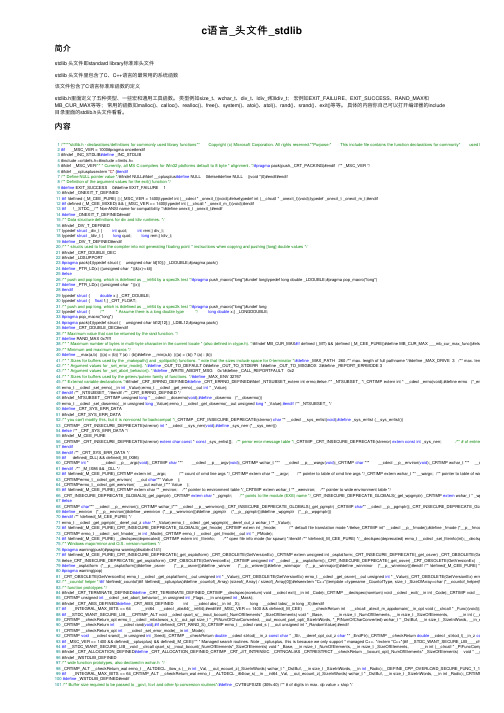
c语⾔_头⽂件_stdlib简介stdlib 头⽂件即standard library标准库头⽂件stdlib 头⽂件⾥包含了C、C++语⾔的最常⽤的系统函数该⽂件包含了C语⾔标准库函数的定义stdlib.h⾥⾯定义了五种类型、⼀些宏和通⽤⼯具函数。
类型例如size_t、wchar_t、div_t、ldiv_t和lldiv_t;宏例如EXIT_FAILURE、EXIT_SUCCESS、RAND_MAX和MB_CUR_MAX等等;常⽤的函数如malloc()、calloc()、realloc()、free()、system()、atoi()、atol()、rand()、srand()、exit()等等。
具体的内容你⾃⼰可以打开编译器的include⽬录⾥⾯的stdlib.h头⽂件看看。
内容1/*****stdlib.h - declarations/definitions for commonly used library functions** Copyright (c) Microsoft Corporation. All rights reserved.**Purpose:* This include file contains the function declarations for commonly* used library functio 2#if _MSC_VER > 1000#pragma once#endif3 #ifndef _INC_STDLIB#define _INC_STDLIB4 #include <crtdefs.h>#include <limits.h>5 #ifdef _MSC_VER/** * Currently, all MS C compilers for Win32 platforms default to 8 byte * alignment. */#pragma pack(push,_CRT_PACKING)#endif /** _MSC_VER */6 #ifdef __cplusplusextern "C" {#endif7/** Define NULL pointer value */#ifndef NULL#ifdef __cplusplus#define NULL 0#else#define NULL ((void *)0)#endif#endif8/** Definition of the argument values for the exit() function */9#define EXIT_SUCCESS 0#define EXIT_FAILURE 110 #ifndef _ONEXIT_T_DEFINED11#if !defined (_M_CEE_PURE) || (_MSC_VER < 1400)typedef int (__cdecl * _onexit_t)(void);#elsetypedef int (__clrcall * _onexit_t)(void);typedef _onexit_t _onexit_m_t;#endif12#if defined (_M_CEE_MIXED) && (_MSC_VER >= 1400)typedef int (__clrcall * _onexit_m_t)(void);#endif13#if !__STDC__/** Non-ANSI name for compatibility */#define onexit_t _onexit_t#endif14#define _ONEXIT_T_DEFINED#endif15/** Data structure definitions for div and ldiv runtimes. */16 #ifndef _DIV_T_DEFINED17 typedef struct _div_t { int quot; int rem;} div_t;18 typedef struct _ldiv_t { long quot; long rem;} ldiv_t;19#define _DIV_T_DEFINED#endif20/** * structs used to fool the compiler into not generating floating point * instructions when copying and pushing [long] double values */21 #ifndef _CRT_DOUBLE_DEC22 #ifndef _LDSUPPORT23#pragma pack(4)typedef struct { unsigned char ld[10];} _LDOUBLE;#pragma pack()24#define _PTR_LD(x) ((unsigned char *)(&(x)->ld))25#else26/** push and pop long, which is #defined as __int64 by a spec2k test */#pragma push_macro("long")#undef longtypedef long double _LDOUBLE;#pragma pop_macro("long")27#define _PTR_LD(x) ((unsigned char *)(x))28#endif29 typedef struct { double x;} _CRT_DOUBLE;30 typedef struct { float f;} _CRT_FLOAT;31/** push and pop long, which is #defined as __int64 by a spec2k test */#pragma push_macro("long")#undef long32 typedef struct { /** * Assume there is a long double type */long double x;} _LONGDOUBLE;33#pragma pop_macro("long")34#pragma pack(4)typedef struct { unsigned char ld12[12];} _LDBL12;#pragma pack()35#define _CRT_DOUBLE_DEC#endif36/** Maximum value that can be returned by the rand function. */37#define RAND_MAX 0x7fff38/** * Maximum number of bytes in multi-byte character in the current locale * (also defined in ctype.h). */#ifndef MB_CUR_MAX#if defined (_MT) && (defined (_M_CEE_PURE))#define MB_CUR_MAX ___mb_cur_max_func()#else#define MB_ 39/** Minimum and maximum macros */40#define __max(a,b) (((a) > (b)) ? (a) : (b))#define __min(a,b) (((a) < (b)) ? (a) : (b))41/** * Sizes for buffers used by the _makepath() and _splitpath() functions. * note that the sizes include space for 0-terminator */#define _MAX_PATH 260 /** max. length of full pathname */#define _MAX_DRIVE 3 /** max. length of drive c 42/** * Argument values for _set_error_mode(). */#define _OUT_TO_DEFAULT 0#define _OUT_TO_STDERR 1#define _OUT_TO_MSGBOX 2#define _REPORT_ERRMODE 343/** * Argument values for _set_abort_behavior(). */#define _WRITE_ABORT_MSG 0x1#define _CALL_REPORTFAULT 0x244/** * Sizes for buffers used by the getenv/putenv family of functions. */#define _MAX_ENV 3276745/** External variable declarations */#ifndef _CRT_ERRNO_DEFINED#define _CRT_ERRNO_DEFINED#ifdef _NTSUBSET_extern int errno;#else /** _NTSUBSET_ */_CRTIMP extern int * __cdecl _errno(void);#define errno (*_errno())46 errno_t __cdecl _set_errno(__in int _Value);errno_t __cdecl _get_errno(__out int * _Value);47#endif /** _NTSUBSET_ */#endif /** _CRT_ERRNO_DEFINED */48 #ifndef _NTSUBSET__CRTIMP unsigned long * __cdecl __doserrno(void);#define _doserrno (*__doserrno())49 errno_t __cdecl _set_doserrno(__in unsigned long _Value);errno_t __cdecl _get_doserrno(__out unsigned long * _Value);#endif /** _NTSUBSET_ */50#define _CRT_SYS_ERR_DATA51 #ifndef _CRT_SYS_ERR_DATA52/** you can't modify this, but it is non-const for backcompat */_CRTIMP _CRT_INSECURE_DEPRECATE(strerror) char ** __cdecl __sys_errlist(void);#define _sys_errlist (__sys_errlist())53 _CRTIMP _CRT_INSECURE_DEPRECATE(strerror) int * __cdecl __sys_nerr(void);#define _sys_nerr (*__sys_nerr())54#else /** _CRT_SYS_ERR_DATA */55 #ifndef _M_CEE_PURE56 _CRTIMP _CRT_INSECURE_DEPRECATE(strerror) extern char const * const _sys_errlist[]; /** perror error message table */_CRTIMP _CRT_INSECURE_DEPRECATE(strerror) extern const int _sys_nerr; /** # of entries in sys_errlis 57#endif58#endif /** _CRT_SYS_ERR_DATA */59#if defined(_DLL) && defined(_M_IX86)60 _CRTIMP int * __cdecl __p___argc(void);_CRTIMP char *** __cdecl __p___argv(void);_CRTIMP wchar_t *** __cdecl __p___wargv(void);_CRTIMP char *** __cdecl __p__environ(void);_CRTIMP wchar_t *** __cdecl __p__w 61#endif /** _M_IX86 && _DLL */62#if !defined(_M_CEE_PURE)_CRTIMP extern int __argc; /** count of cmd line args */_CRTIMP extern char ** __argv; /** pointer to table of cmd line args */_CRTIMP extern wchar_t ** __wargv; /** pointer to table of wide cmd line ar63 _CRTIMPerrno_t__cdecl_get_environ( __out char*** Value );64 _CRTIMPerrno_t__cdecl_get_wenviron( __out wchar_t*** Value );65#if !defined(_M_CEE_PURE)_CRTIMP extern char ** _environ; /** pointer to environment table */_CRTIMP extern wchar_t ** _wenviron; /** pointer to wide environment table */66 _CRT_INSECURE_DEPRECATE_GLOBALS(_get_pgmptr) _CRTIMP extern char * _pgmptr; /** points to the module (EXE) name */_CRT_INSECURE_DEPRECATE_GLOBALS(_get_wpgmptr) _CRTIMP extern wchar_t * _wpgmptr;67#else68 _CRTIMP char*** __cdecl __p__environ();_CRTIMP wchar_t*** __cdecl __p__wenviron();_CRT_INSECURE_DEPRECATE_GLOBALS(_get_pgmptr) _CRTIMP char** __cdecl __p__pgmptr();_CRT_INSECURE_DEPRECATE_GLOBALS(_get_ 69#define _environ (*__p__environ())#define _wenviron (*__p__wenviron())#define _pgmptr (*__p__pgmptr())#define _wpgmptr (*__p__wpgmptr())70#endif /** !defined(_M_CEE_PURE) */71 errno_t __cdecl _get_pgmptr(__deref_out_z char ** _Value);errno_t __cdecl _get_wpgmptr(__deref_out_z wchar_t ** _Value);72#if !defined(_M_CEE_PURE)_CRT_INSECURE_DEPRECATE_GLOBALS(_get_fmode) _CRTIMP extern int _fmode; /** default file translation mode */#else_CRTIMP int* __cdecl __p__fmode();#define _fmode (*__p__fmode())#endif /** 73 _CRTIMP errno_t __cdecl _set_fmode(__in int _Mode);_CRTIMP errno_t __cdecl _get_fmode(__out int * _PMode);74#if !defined(_M_CEE_PURE) __declspec(deprecated) _CRTIMP extern int _fileinfo; /** open file info mode (for spawn) */#endif /** !defined(_M_CEE_PURE) */__declspec(deprecated) errno_t __cdecl _set_fileinfo(int);__declspec(deprecate 75/** Windows major/minor and O.S. version numbers */76#pragma warning(push)#pragma warning(disable:4141)77#if !defined(_M_CEE_PURE)_CRT_INSECURE_DEPRECATE(_get_osplatform) _CRT_OBSOLETE(GetVersionEx) _CRTIMP extern unsigned int _osplatform;_CRT_INSECURE_DEPRECATE(_get_osver) _CRT_OBSOLETE(GetVersionEx) 78 #else_CRT_INSECURE_DEPRECATE(_get_osplatform) _CRT_OBSOLETE(GetVersionEx) _CRTIMP unsigned int* __cdecl __p__osplatform();_CRT_INSECURE_DEPRECATE(_get_osver) _CRT_OBSOLETE(GetVersionEx) _CRTIMP uns 79#define _osplatform (*__p__osplatform())#define _osver (*__p__osver())#define _winver (*__p__winver())#define _winmajor (*__p__winmajor())#define _winminor (*__p__winminor())#endif /** !defined(_M_CEE_PURE) */80#pragma warning(pop)81 _CRT_OBSOLETE(GetVersionEx) errno_t __cdecl _get_osplatform(__out unsigned int * _Value);_CRT_OBSOLETE(GetVersionEx) errno_t __cdecl _get_osver(__out unsigned int * _Value);_CRT_OBSOLETE(GetVersionEx) errno_t __cdecl _ 82/** _countof helper */#if !defined(_countof)#if !defined(__cplusplus)#define _countof(_Array) (sizeof(_Array) / sizeof(_Array[0]))#elseextern "C++"{template <typename _CountofType, size_t _SizeOfArray>char (*__countof_helper(UNALIGNED 83/** function prototypes */84 #ifndef _CRT_TERMINATE_DEFINED#define _CRT_TERMINATE_DEFINED_CRTIMP __declspec(noreturn) void __cdecl exit(__in int _Code);_CRTIMP __declspec(noreturn) void __cdecl _exit(__in int _Code);_CRTIMP void __cdecl abort(v85 _CRTIMP unsigned int __cdecl _set_abort_behavior(__in unsigned int _Flags, __in unsigned int _Mask);86 #ifndef _CRT_ABS_DEFINED#define _CRT_ABS_DEFINED int __cdecl abs(__in int _X); long __cdecl labs(__in long _X);#endif87#if _INTEGRAL_MAX_BITS >= 64 __int64 __cdecl _abs64(__int64);#endif#if _MSC_VER >= 1400 && defined(_M_CEE) __checkReturn int __clrcall _atexit_m_appdomain(__in_opt void (__clrcall * _Func)(void));#if defined(_M 88#if __STDC_WANT_SECURE_LIB___CRTIMP_ALT void __cdecl qsort_s(__inout_bcount(_NumOfElements* _SizeOfElements) void * _Base, __in rsize_t _NumOfElements, __in rsize_t _SizeOfElements, __in int (__cdecl * _PtFu89 _CRTIMP __checkReturn_opt errno_t __cdecl _mbstowcs_s_l(__out_opt size_t * _PtNumOfCharConverted, __out_ecount_part_opt(_SizeInWords, *_PtNumOfCharConverted) wchar_t * _DstBuf, __in size_t _SizeInWords, __in_ecount_z(_Ma90 _CRTIMP __checkReturn int __cdecl rand(void);#if defined(_CRT_RAND_S)_CRTIMP errno_t __cdecl rand_s ( __out unsigned int *_RandomValue);#endif91 _CRTIMP __checkReturn_opt int __cdecl _set_error_mode(__in int _Mode);92 _CRTIMP void __cdecl srand(__in unsigned int _Seed);_CRTIMP __checkReturn double __cdecl strtod(__in_z const char * _Str, __deref_opt_out_z char ** _EndPtr);_CRTIMP __checkReturn double __cdecl _strtod_l(__in_z const93#if _MSC_VER >= 1400 && defined(__cplusplus) && defined(_M_CEE)/** * Managed search routines. Note __cplusplus, this is because we only support * managed C++. */extern "C++"{#if __STDC_WANT_SECURE_LIB____checkReturn vo 94#if __STDC_WANT_SECURE_LIB__void __clrcall qsort_s(__inout_bcount(_NumOfElements*_SizeOfElements) void * _Base, __in rsize_t _NumOfElements, __in rsize_t _SizeOfElements, __in int (__clrcall * _PtFuncCompare)(void *, c95 #ifndef _CRT_ALLOCATION_DEFINED#define _CRT_ALLOCATION_DEFINED_CRTIMP _CRT_JIT_INTRINSIC _CRTNOALIAS _CRTRESTRICT __checkReturn __bcount_opt(_NumOfElements* _SizeOfElements) void * __cdecl calloc(_96 #ifndef _WSTDLIB_DEFINED97/** wide function prototypes, also declared in wchar.h */98 _CRTIMP_ALT __checkReturn_wat errno_t __ALTDECL _itow_s (__in int _Val, __out_ecount_z(_SizeInWords) wchar_t * _DstBuf, __in size_t _SizeInWords, __in int _Radix);__DEFINE_CPP_OVERLOAD_SECURE_FUNC_1_1(errno_t, _itow 99#if _INTEGRAL_MAX_BITS >= 64_CRTIMP_ALT __checkReturn_wat errno_t __ALTDECL _i64tow_s(__in __int64 _Val, __out_ecount_z(_SizeInWords) wchar_t * _DstBuf, __in size_t _SizeInWords, __in int _Radix);_CRTIMP _CRT_INSE 100#define _WSTDLIB_DEFINED#endif101/** Buffer size required to be passed to _gcvt, fcvt and other fp conversion routines*/#define _CVTBUFSIZE (309+40) /** # of digits in max. dp value + slop */102#if (defined(_DEBUG) || defined(_SYSCRT_DEBUG)) && defined(_CRTDBG_MAP_ALLOC)#pragma push_macro("_fullpath")#undef _fullpath#endif103 _CRTIMP __checkReturn char * __cdecl _fullpath(__out_ecount_z_opt(_SizeInBytes) char * _FullPath, __in_z const char * _Path, __in size_t _SizeInBytes);104#if (defined(_DEBUG) || defined(_SYSCRT_DEBUG)) && defined(_CRTDBG_MAP_ALLOC)#pragma pop_macro("_fullpath")#endif105 _CRTIMP_ALT __checkReturn_wat errno_t __cdecl _ecvt_s(__out_ecount_z(_Size) char * _DstBuf, __in size_t _Size, __in double _Val, __in int _NumOfDights, __out int * _PtDec, __out int * _PtSign);__DEFINE_CPP_OVERLOAD_SECUR 106 _CRTIMP __checkReturn int __cdecl _atodbl(__out _CRT_DOUBLE * _Result, __in_z char * _Str);_CRTIMP __checkReturn int __cdecl _atoldbl(__out _LDOUBLE * _Result, __in_z char * _Str);_CRTIMP __checkReturn int __cdecl _atoflt(__ 107#if _MSC_VER >= 1400 && defined(_M_CEE) _onexit_m_t __clrcall _onexit_m_appdomain(_onexit_m_t _Function); #if defined(_M_CEE_MIXED) _onexit_m_t __clrcall _onexit_m(_onexit_m_t _Function); #else inline _onexit_m_t __ 108 _CRT_INSECURE_DEPRECATE(_splitpath_s) _CRTIMP void __cdecl _splitpath(__in_z const char * _FullPath, __out_z_opt char * _Drive, __out_z_opt char * _Dir, __out_z_opt char * _Filename, __out_z_opt char * _Ext);_CRTIMP_ALT _ 109 _CRTIMP void __cdecl _swab(__inout_ecount_full(_SizeInBytes) char * _Buf1, __inout_ecount_full(_SizeInBytes) char * _Buf2, int _SizeInBytes);110 #ifndef _WSTDLIBP_DEFINED111/** wide function prototypes, also declared in wchar.h */112#if (defined(_DEBUG) || defined(_SYSCRT_DEBUG)) && defined(_CRTDBG_MAP_ALLOC)#pragma push_macro("_wfullpath")#undef _wfullpath#endif113 _CRTIMP __checkReturn wchar_t * __cdecl _wfullpath(__out_ecount_z_opt(_SizeInWords) wchar_t * _FullPath, __in_z const wchar_t * _Path, __in size_t _SizeInWords);114#if (defined(_DEBUG) || defined(_SYSCRT_DEBUG)) && defined(_CRTDBG_MAP_ALLOC)#pragma pop_macro("_wfullpath")#endif115 _CRTIMP_ALT __checkReturn_wat errno_t __ALTDECL _wmakepath_s(__out_ecount_z(_SizeInWords) wchar_t * _PathResult, __in_opt size_t _SizeInWords, __in_z_opt const wchar_t * _Drive, __in_z_opt const wchar_t * _Dir, __in_z_opt 116#define _WSTDLIBP_DEFINED#endif117/** The Win32 API SetErrorMode, Beep and Sleep should be used instead. */_CRT_OBSOLETE(SetErrorMode) _CRTIMP void __cdecl _seterrormode(__in int _Mode);_CRT_OBSOLETE(Beep) _CRTIMP void __cdecl _beep(__in unsigned _F 118#if !__STDC__119/** Non-ANSI names for compatibility */120 #ifndef __cplusplus#define max(a,b) (((a) > (b)) ? (a) : (b))#define min(a,b) (((a) < (b)) ? (a) : (b))#endif121#define sys_errlist _sys_errlist#define sys_nerr _sys_nerr#define environ _environ122#pragma warning(push)#pragma warning(disable: 4141) /** Using deprecated twice */ _CRT_NONSTDC_DEPRECATE(_ecvt) _CRT_INSECURE_DEPRECATE(_ecvt_s) _CRTIMP __checkReturn char * __cdecl ecvt(__in double _Val, __in in 123#endif /** __STDC__ */124 #ifdef __cplusplus}125#endif126 #ifdef _MSC_VER#pragma pack(pop)#endif /** _MSC_VER */127#endif /** _INC_STDLIB *//** 88bf0570-3001-4e78-a5f2-be5765546192 */View Code包含的函数输⼊样式:C语⾔模式:#include <stdlib.h>C++样式:#include <cstdlib>1函数名称:calloc函数原型: void * calloc(unsigned n,unsigned size);函数功能: 分配n个数据项的内存连续空间,每个数据项的⼤⼩为size函数返回: 分配内存单元的起始地址,如果不成功,返回02函数名称:free函数原型: void free(void* p);函数功能: 释放p所指的内存区函数返回:参数说明: p-被释放的指针3函数名称:malloc函数原型: void * malloc(unsigned size);函数功能: 分配size字节的存储区函数返回: 所分配的内存区地址,如果内存不够,返回04函数名称: realloc函数原型: void * realloc(void * p,unsigned size);函数功能: 将p所指出的已分配内存区的⼤⼩改为size,size可以⽐原来分配的空间⼤或⼩函数返回: 返回指向该内存区的指针.NULL-分配失败5函数名称: rand函数原型: int rand(void);函数功能: 产⽣0到32767间的随机整数(0到0x7fff之间)函数返回: 随机整数6函数名称: abort函数原型: void abort(void)函数功能: 异常终⽌⼀个进程.7函数名称: exit函数原型: void exit(int state)函数功能: 程序中⽌执⾏,返回调⽤过程函数返回:参数说明: state:0-正常中⽌,⾮0-⾮正常中⽌8函数名称: getenv函数原型: char* getenv(const char *name)函数功能: 返回⼀个指向环境变量的指针函数返回:环境变量的定义参数说明: name-环境字符串9函数名称: putenv函数原型: int putenv(const char *name)函数功能: 将字符串name增加到DOS环境变量中函数返回: 0:操作成功,-1:操作失败参数说明: name-环境字符串10函数名称: labs函数原型: long labs(long num)函数功能: 求长整型参数的绝对值函数返回:绝对值11函数名称: atof函数原型: double atof(char *str)函数功能: 将字符串转换成⼀个双精度数值函数返回: 转换后的数值参数说明: str-待转换浮点型数的字符串12函数名称: atoi函数原型: int atoi(char *str)函数功能: 将字符串转换成⼀个整数值函数返回: 转换后的数值参数说明: str-待转换为整型数的字符串13函数名称: atol函数原型: long atol(char *str)函数功能: 将字符串转换成⼀个长整数函数返回: 转换后的数值参数说明: str-待转换为长整型的字符串14函数名称:ecvt函数原型: char *ecvt(double value,int ndigit,int *dec,int *sign)函数功能: 将浮点数转换为字符串函数返回: 转换后的字符串指针参数说明: value-待转换底浮点数,ndigit-转换后的字符串长度15函数名称:fcvt函数原型: char *fcvt(double value,int ndigit,int *dec,int *sign)函数功能: 将浮点数变成⼀个字符串函数返回: 转换后字符串指针参数说明: value-待转换底浮点数,ndigit-转换后底字符串长度。
C语言头文件大全【范本模板】

标准C语言头文件ISO C标准定义的头文件(24项)〈assert。
h〉验证程序断言<complex.h> 支持复数算术运算<ctype.h〉字符类型〈errno。
h〉出错码<fenv.h> 浮点环境〈float.h> 浮点常量<inttypes.h> 整型格式转换〈iso646。
h〉替代关系操作符宏〈limits.h> 实现常量<locale。
h〉局部类别<math。
h> 数学常量<setjmp.h> 非局部goto〈signal。
h〉信号〈stdarg。
h〉可变参数表〈stdbool.h> 布尔类型和值〈stddef。
h〉标准定义〈stdint。
h〉整型〈stdio.h> 标准I/O库〈stdlib。
h〉实用程序库函数<string.h〉字符串操作<tgmath.h〉通用类型数学宏〈time。
h〉时间和日期<wchar.h〉宽字符支持〈wctype。
h> 宽字符分类和映射支持POSIX标准定义的必须的头文件(26项)〈dirent。
h> 目录项<fcntl。
h〉文件控制<fnmatch.h> 文件名匹配类型〈glob。
h> 路径名模式匹配类型<grp。
h〉组文件<netdb.h> 网络数据库操作<pwd。
h> 口令文件<regex。
h〉正则表达式〈tar。
h> tar归档值<termios.h〉终端I/O 〈unistd.h> 符号常量〈utime.h> 文件时间〈wordexp。
h> 字扩展类型<arpa/inet。
h〉 Internet定义〈net/if.h〉套接字本地接口〈netinet/in。
h> Internet地址族 <netinet/tcp.h> 传输控制协议<sys/mman。
C语言头文件大全
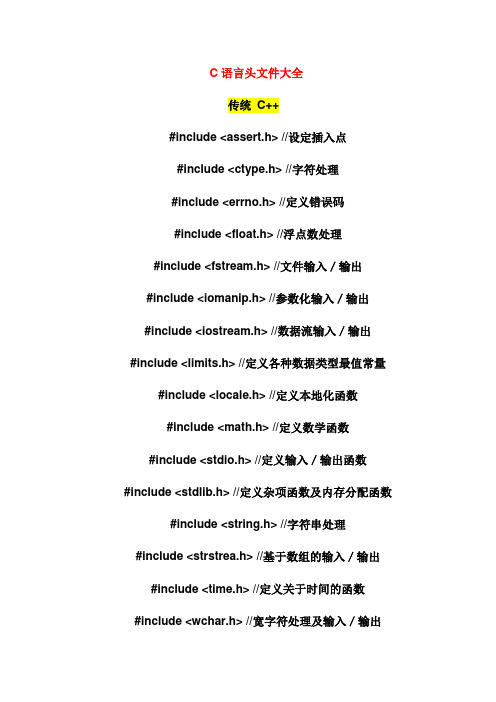
C语言头文件大全传统C++#include <assert.h> //设定插入点#include <ctype.h> //字符处理#include <errno.h> //定义错误码#include <float.h> //浮点数处理#include <fstream.h> //文件输入/输出#include <iomanip.h> //参数化输入/输出#include <iostream.h> //数据流输入/输出#include <limits.h> //定义各种数据类型最值常量#include <locale.h> //定义本地化函数#include <math.h> //定义数学函数#include <stdio.h> //定义输入/输出函数#include <stdlib.h> //定义杂项函数及内存分配函数#include <string.h> //字符串处理#include <strstrea.h> //基于数组的输入/输出#include <time.h> //定义关于时间的函数#include <wchar.h> //宽字符处理及输入/输出#include <wctype.h> //宽字符分类标准C++ (同上的不再注释)#include <algorithm> //STL 通用算法#include <bitset> //STL 位集容器#include <cctype>#include <cerrno>#include <clocale>#include <cmath>#include <complex> //复数类#include <cstdio>#include <cstdlib>#include <cstring>#include <ctime>#include <deque> //STL 双端队列容器#include <exception> //异常处理类#include <fstream>#include <functional> //STL 定义运算函数(代替运算符)#include <limits>#include <list> //STL 线性列表容器#include <map> //STL 映射容器#include <iomanip>#include <ios> //基本输入/输出支持#include <iosfwd> //输入/输出系统使用的前置声明#include <iostream>#include <istream> //基本输入流#include <ostream> //基本输出流#include <queue> //STL 队列容器#include <set> //STL 集合容器#include <sstream> //基于字符串的流#include <stack> //STL 堆栈容器#include <stdexcept> //标准异常类#include <streambuf> //底层输入/输出支持#include <string> //字符串类#include <utility> //STL 通用模板类#include <vector> //STL 动态数组容器#include <cwchar>#include <cwctype>using namespace std;C99 增加#include <complex.h> //复数处理#include <fenv.h> //浮点环境#include <inttypes.h> //整数格式转换#include <stdbool.h> //布尔环境#include <stdint.h> //整型环境#include <tgmath.h> //通用类型数学宏。
C语言头文件大全
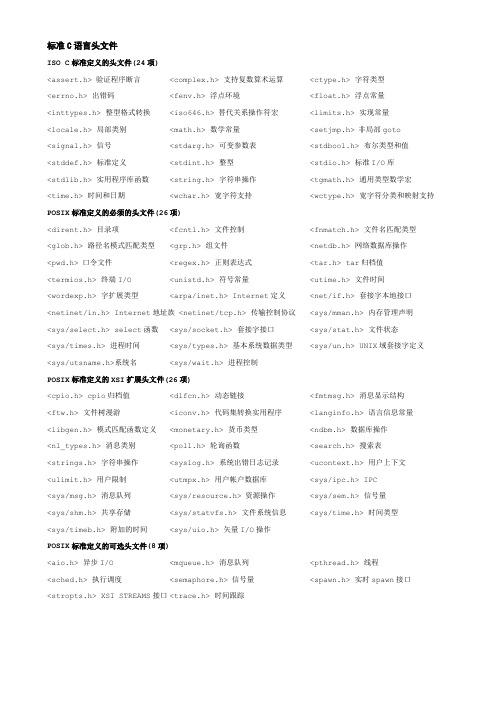
标准C语言头文件ISO C标准定义的头文件(24项)<assert.h> 验证程序断言<complex.h> 支持复数算术运算<ctype.h> 字符类型<errno.h> 出错码<fenv.h> 浮点环境<float.h> 浮点常量<inttypes.h> 整型格式转换<iso646.h> 替代关系操作符宏<limits.h> 实现常量<locale.h> 局部类别<math.h> 数学常量<setjmp.h> 非局部goto<signal.h> 信号<stdarg.h> 可变参数表<stdbool.h> 布尔类型和值<stddef.h> 标准定义<stdint.h> 整型<stdio.h> 标准I/O库<stdlib.h> 实用程序库函数<string.h> 字符串操作<tgmath.h> 通用类型数学宏<time.h> 时间和日期<wchar.h> 宽字符支持<wctype.h> 宽字符分类和映射支持POSIX标准定义的必须的头文件(26项)<dirent.h> 目录项<fcntl.h> 文件控制<fnmatch.h> 文件名匹配类型<glob.h> 路径名模式匹配类型<grp.h> 组文件<netdb.h> 网络数据库操作<pwd.h> 口令文件<regex.h> 正则表达式<tar.h> tar归档值<termios.h> 终端I/O <unistd.h> 符号常量<utime.h> 文件时间<wordexp.h> 字扩展类型<arpa/inet.h> Internet定义<net/if.h> 套接字本地接口<netinet/in.h> Internet地址族 <netinet/tcp.h> 传输控制协议<sys/mman.h> 内存管理声明<sys/select.h> select函数<sys/socket.h> 套接字接口<sys/stat.h> 文件状态<sys/times.h> 进程时间<sys/types.h> 基本系统数据类型<sys/un.h> UNIX域套接字定义<sys/utsname.h>系统名<sys/wait.h> 进程控制POSIX标准定义的XSI扩展头文件(26项)<cpio.h> cpio归档值<dlfcn.h> 动态链接<fmtmsg.h> 消息显示结构<ftw.h> 文件树漫游<iconv.h> 代码集转换实用程序<langinfo.h> 语言信息常量<libgen.h> 模式匹配函数定义<monetary.h> 货币类型<ndbm.h> 数据库操作<nl_types.h> 消息类别<poll.h> 轮询函数<search.h> 搜索表<strings.h> 字符串操作<syslog.h> 系统出错日志记录<ucontext.h> 用户上下文<ulimit.h> 用户限制<utmpx.h> 用户帐户数据库<sys/ipc.h> IPC<sys/msg.h> 消息队列<sys/resource.h> 资源操作<sys/sem.h> 信号量<sys/shm.h> 共享存储<sys/statvfs.h> 文件系统信息<sys/time.h> 时间类型<sys/timeb.h> 附加的时间<sys/uio.h> 矢量I/O操作POSIX标准定义的可选头文件(8项)<aio.h> 异步I/O <mqueue.h> 消息队列<pthread.h> 线程<sched.h> 执行调度<semaphore.h> 信号量<spawn.h> 实时spawn接口<stropts.h> XSI STREAMS接口<trace.h> 时间跟踪标准 C++ 语言头文件(54个其中16个用于构建STL,3个为附加非必须)<algorithm>STL通用算法<bitset> STL位集容器<cassert> 用于在程序运行时执行断言<cctype> 字符处理<cerrno> 错误码<cfloat> 用于测试浮点类型属性<ciso646> ISO646变体字符集<climits> 测试整数类型属性<clocale> 本地化函数<cmath> 数学函数<complex>复数类<csetjmp> 执行非内部的goto语句<csignal> 信号<cstdarg> 访问参数数量变化的函数<cstddef> 用于定义实用的类型和宏<cstdio> 输入/输出<cstdlib> 杂项函数及内存分配<cstring> 字符串<ctime> 时间<cwchar> 宽字符处理及输入/输出<cwctype> 宽字符分类<deque> STL双端队列容器<exception> 异常处理类<fstream> 文件流<functional> STL函数对象<iomanip> 参数化输入/输出<ios>基本输入/输出支持<iosfwd> 输入/输出前置声明<iostream> 数据流输入/输出<istream> 基本输入流<iterator> 遍历序列的类<limits> 各种数据类型最值常量<list>STL线性列表容器<locale> 国际化支持<map> STL映射容器<memory> 专用内存分配器<new> 基本内存分配和释放<numeric> 通用的数字操作<ostream> 基本输出流<queue> STL 队列容器<set> STL 集合容器<sstream> 基于字符串的流<stack> STL 堆栈容器<stdexcept> 标准异常类<streambuf> iostream 的缓冲区类<string> 字符串类<strstream> 非内存字符序列的流类<typeinfo> 运行时类型标识<utility> STL 通用模板类<valarray> 支持值数组的类和模版类<vector> STL 动态数组容器标准C++附加的头文件(3个)非必须<hash_map> <hash_set> <slist>The Standard C++ library consists of 51 required headers.This implementation also includes three additional headers,<hash_map>,<hash_set>,and <slist>,not required by the C++ Standard,for a total of 54 headers.Of these 54 headers,16 constitute the Standard Template Library,or STL.These are indicated below with the notation<algorithm> -- (STL) for defining numerous templates that implement useful algorithms<bitset> -- for defining a template class that administers sets of bits<complex> -- for defining a template class that supports complex arithmetic<deque> -- (STL) for defining a template class that implements a deque container<exception> -- for defining several functions that control exception handling<fstream> -- for defining several iostreams template classes that manipulate exteral files<functional>-- (STL) for defining several templates that help construct predicates for the templates defined in <algorithm> and <numeric><hash_map> -- (STL) for defining template classes that implement hashed associative containersthat map keys to values<hash_set> -- (STL) for defining template classes that implement hashed associative containers<iomanip> -- for declaring several iostreams manipulators that take an argument<ios> -- for defining the template class that serves as the base for many iostreams classes<iosfwd> -- for declaring several iostreams template classes before they are necessarilydefined<iostream> -- for declaring the iostreams objects that manipulate the standard streams<istream> -- for defining the template class that performs extractions<iterator> -- (STL) for defining several templates that help define and manipulate iterators<limits> -- for testing numeric type properties<list>-- (STL) for defining a template class that implements a doubly linked list container<locale> -- for defining several classes and templates that controllocale-specific behavior, as in the iostreams classes<map>-- (STL) for defining template classes that implement associative containers thatmap keys to values<memory>-- (STL) for defining several templates that allocate and free storage for variouscontainer classes<new> -- for declaring several functions that allocate and free storage<numeric>-- (STL) for defining several templates that implement useful numeric functions<ostream> -- for defining the template class that performs insertions<queue> -- (STL) for defining a template class that implements a queue container<set>-- (STL) for defining template classes that implement associative containers<slist>-- (STL) for defining a template class that implements a singly linked list container<sstream> -- for defining several iostreams template classes that manipulate string containers<stack> -- (STL) for defining a template class that implements a stack container<stdexcept> -- for defining several classes useful for reporting exceptions<streambuf> -- for defining template classes that buffer iostreams operations<string> -- for defining a template class that implements a string container<strstream> -- for defining several iostreams classes that manipulate in-memory character sequences<typeinfo> -- for defining class type_info, the result of the typeid operator<utility>-- (STL) for defining several templates of general utility<valarray> -- for defining several classes and template classes that support value-oriented arrays<vector>-- (STL) for defining a template class that implements a vector container新的C标准库<cassert> -- for enforcing assertions when functions execute<cctype> -- for classifying characters<cerrno> -- for testing error codes reported by library functions<cfloat> -- for testing floating-point type properties<ciso646> -- for programming in ISO 646 variant character sets<climits> -- for testing integer type properties<clocale> -- for adapting to different cultural conventions<cmath> -- for computing common mathematical functions<csetjmp> -- for executing nonlocal goto statements<csignal> -- for controlling various exceptional conditions<cstdarg> -- for accessing a varying number of arguments<cstddef> -- for defining several useful types and macros<cstdio> -- for performing input and output<cstdlib> -- for performing a variety of operations<cstring> -- for manipulating several kinds of strings<ctime> -- for converting between various time and date formats<cwchar> -- for manipulating wide streams and several kinds of strings<cwctype> -- for classifying wide characters旧的C标准库<assert.h> -- for enforcing assertions when functions execute<ctype.h> -- for classifying characters<errno.h> -- for testing error codes reported by library functions<float.h> -- for testing floating-point type properties<iso646.h> -- for programming in ISO 646 variant character sets<limits.h> -- for testing integer type properties<locale.h> -- for adapting to different cultural conventions<math.h> -- for computing common mathematical functions<setjmp.h> -- for executing nonlocal goto statements<signal.h> -- for controlling various exceptional conditions<stdarg.h> -- for accessing a varying number of arguments<stddef.h> -- for defining several useful types and macros<stdio.h> -- for performing input and output<stdlib.h> -- for performing a variety of operations<string.h> -- for manipulating several kinds of strings<time.h> -- for converting between various time and date formats<wchar.h> -- for manipulating wide streams and several kinds of strings<wctype.h> -- for classifying wide charactersFinally, in this implementation, the Standard C++ library also includes several headers for compatibility with traditional C++ libraries:<fstream.h> -- for defining several iostreams template classes that manipulate exteral files <iomanip.h> -- for declaring several iostreams manipulators that take an argument<iostream.h> -- for declaring the iostreams objects that manipulate the standard streams <new.h> -- for declaring several functions that allocate and free storage<stl.h> -- for declaring several template classes that aid migration from older versions of the Standard Template Library。
c语言头文件 结构体定义
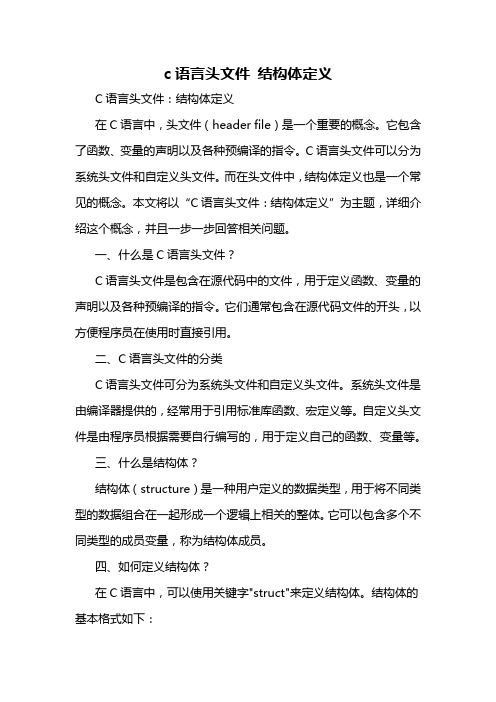
c语言头文件结构体定义C语言头文件:结构体定义在C语言中,头文件(header file)是一个重要的概念。
它包含了函数、变量的声明以及各种预编译的指令。
C语言头文件可以分为系统头文件和自定义头文件。
而在头文件中,结构体定义也是一个常见的概念。
本文将以“C语言头文件:结构体定义”为主题,详细介绍这个概念,并且一步一步回答相关问题。
一、什么是C语言头文件?C语言头文件是包含在源代码中的文件,用于定义函数、变量的声明以及各种预编译的指令。
它们通常包含在源代码文件的开头,以方便程序员在使用时直接引用。
二、C语言头文件的分类C语言头文件可分为系统头文件和自定义头文件。
系统头文件是由编译器提供的,经常用于引用标准库函数、宏定义等。
自定义头文件是由程序员根据需要自行编写的,用于定义自己的函数、变量等。
三、什么是结构体?结构体(structure)是一种用户定义的数据类型,用于将不同类型的数据组合在一起形成一个逻辑上相关的整体。
它可以包含多个不同类型的成员变量,称为结构体成员。
四、如何定义结构体?在C语言中,可以使用关键字"struct"来定义结构体。
结构体的基本格式如下:struct 结构体名称{成员1的类型成员1的名称;成员2的类型成员2的名称;...};例如,如果我们要定义一个表示学生的结构体,可以这样写:struct Student {int id;char name[20];int age;};五、如何使用结构体?定义结构体之后,我们可以声明结构体的变量并对其进行操作。
首先需要在函数中声明结构体变量,然后使用“.”(成员运算符)来访问结构体的成员。
例如,我们可以这样声明一个学生结构体变量并对其赋值:struct Student stu;stu.id = 123;strcpy(, "John");stu.age = 18;六、结构体的指针和动态内存分配除了直接声明结构体变量外,我们还可以通过结构体指针来操作结构体。
C语言头文件大全
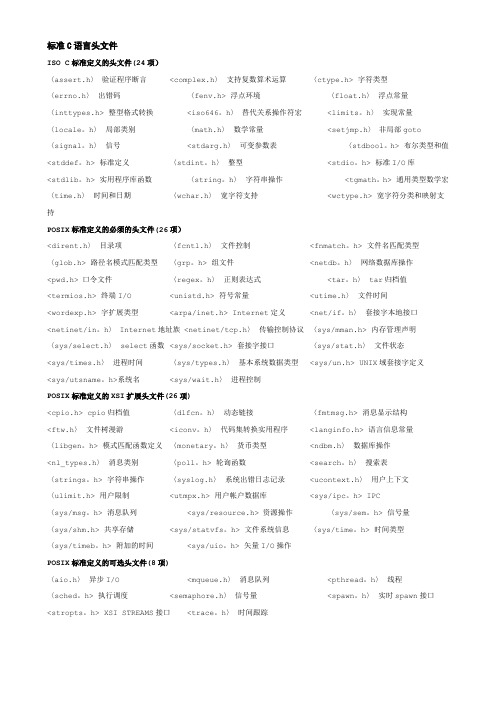
标准C语言头文件ISO C标准定义的头文件(24项)〈assert.h〉验证程序断言<complex.h〉支持复数算术运算〈ctype.h> 字符类型〈errno.h〉出错码〈fenv.h> 浮点环境〈float.h〉浮点常量〈inttypes.h> 整型格式转换<iso646。
h〉替代关系操作符宏<limits。
h〉实现常量〈locale。
h〉局部类别〈math.h〉数学常量<setjmp.h〉非局部goto 〈signal。
h〉信号<stdarg.h〉可变参数表〈stdbool。
h> 布尔类型和值<stddef。
h> 标准定义〈stdint。
h〉整型<stdio。
h> 标准I/O库<stdlib。
h> 实用程序库函数〈string。
h〉字符串操作<tgmath。
h> 通用类型数学宏〈time.h〉时间和日期〈wchar.h〉宽字符支持<wctype.h> 宽字符分类和映射支持POSIX标准定义的必须的头文件(26项)<dirent.h〉目录项〈fcntl.h〉文件控制<fnmatch。
h> 文件名匹配类型〈glob.h> 路径名模式匹配类型〈grp。
h> 组文件<netdb。
h〉网络数据库操作<pwd.h> 口令文件〈regex。
h〉正则表达式<tar。
h〉 tar归档值<termios.h> 终端I/O <unistd.h> 符号常量<utime.h〉文件时间<wordexp.h> 字扩展类型<arpa/inet.h> Internet定义<net/if。
h〉套接字本地接口<netinet/in。
h〉 Internet地址族 <netinet/tcp.h〉传输控制协议〈sys/mman.h> 内存管理声明〈sys/select.h〉 select函数<sys/socket.h> 套接字接口〈sys/stat.h〉文件状态<sys/times.h〉进程时间〈sys/types.h〉基本系统数据类型<sys/un.h> UNIX域套接字定义<sys/utsname。
c语言头文件的定义及语法

c语⾔头⽂件的定义及语法
c头⽂件的定义
头⽂件是扩展名为.h的⽂件,包含了函数声明和宏定义(宏定义就是#define),引⽤到程序中。
头⽂件有两种类型:1.编译器⾃带的头⽂件(如stdio.h)
2.程序员编写的头⽂件
在程序中要使⽤头⽂件时,需要⽤c预处理指令#include来引⽤它,引⽤头⽂件其实就是将头⽂件的源代码复制到你写的源代码当中,但头⽂件的源代码就不⽤被展⽰出来。
引⽤头⽂件的语法
c头⽂件引⽤有两种语法:
#include<add>
这种语法⽤于引⽤系统头⽂件。
它在系统⽬录的标准列表中搜索名为 file 的⽂件。
#include“add”
这种形式⽤于引⽤⽤户头⽂件。
它在包含当前⽂件的⽬录中搜索名为 file 的⽂件。
有条件引⽤
例如,需要指定在不同的操作系统上使⽤的配置参数。
您可以通过⼀系列条件来实现这点,如下:
#if SYSTEM_1
# include "system_1.h"
#elif SYSTEM_2
# include "system_2.h"
#elif SYSTEM_3
...
#endif
但是当头⽂件过多时,预处理器使⽤宏定义来定义头⽂件的名称。
这就是有条件引⽤。
#define SYSTEM_H "system_1.h"
...
#include SYSTEM_H。
c语言中头文件的作用和使用方法

c语言中头文件的作用和使用方法C语言中头文件的作用和使用1. 什么是头文件?在C语言中,头文件是包含一些预定义的常量、宏定义、函数声明或数据结构定义的文件。
头文件的扩展名通常为.h,它可以被包含在C语言源代码中,以便在编译时进行预处理。
2. 头文件的作用头文件的主要作用有以下几点:•提供函数和变量的声明:头文件中可以包含函数的声明,使得其他源代码文件可以调用声明在头文件中的函数,而不需要重复写函数的原型声明。
•定义常量和宏:头文件中可以包含常量和宏的定义,以便在不同的源代码文件中共享使用。
•实现模块化编程:通过将相关函数和变量的声明和定义放在同一个头文件中,可以实现代码的模块化,提高代码的可读性和可维护性。
•提高编译速度:由于头文件中的内容可以在编译前进行预处理,预处理器会将头文件的内容直接复制到源代码文件中,避免了重复代码的输入,也可以加快编译速度。
3. 头文件的使用3.1 包含头文件在C语言源代码中,通过使用#include指令可以包含头文件。
一般情况下,包含头文件的方式有两种:•使用尖括号<>包含系统提供的头文件:例如#include <stdio.h>,这种方式会在系统目录中查找相应的头文件。
•使用双引号""包含自定义的头文件:例如#include"myheader.h",这种方式会首先在当前目录中查找相应的头文件,如果找不到再去系统目录中查找。
3.2 防止重复包含由于头文件的常见作用是提供声明和定义,为了防止多次包含同一个头文件引起的重定义错误,可以在头文件中使用预处理指令#ifndef、#define、#endif进行包含防护。
#ifndef MYHEADER_H#define MYHEADER_H// 头文件内容#endif这样,在多个源代码文件中包含同一个头文件时,只会包含一次,避免了重复定义的错误。
4. 常见的C标准库头文件C语言提供了一些常见的标准库头文件,包含了一些常用的函数和宏定义。
C语言头文件大全修订版

C语言头文件大全修订版IBMT standardization office【IBMT5AB-IBMT08-IBMT2C-ZZT18】标准C语言头文件ISO C标准定义的头文件(24项)<assert.h> 验证程序断言<complex.h>?支持复数算术运算<ctype.h>?字符类型<errno.h>?出错码<fenv.h>?浮点环境<float.h>?浮点常量<inttypes.h>?整型格式转换<iso646.h> 替代关系操作符宏<limits.h>?实现常量<locale.h>?局部类别<math.h>?数学常量<setjmp.h> 非局部goto<signal.h>?信号<stdarg.h>?可变参数表<stdbool.h>?布尔类型和值<stddef.h>?标准定义<stdint.h>?整型<stdio.h>?标准I/O库<stdlib.h>?实用程序库函数<string.h>?字符串操作<tgmath.h>?通用类型数学宏<time.h>?时间和日期<wchar.h>?宽字符支持<wctype.h>?宽字符分类和映射支持POSIX标准定义的必须的头文件(26项)<dirent.h>?目录项<fcntl.h>?文件控制<fnmatch.h>?文件名匹配类型<glob.h>?路径名模式匹配类型<grp.h>?组文件<netdb.h>?网络数据库操作<pwd.h> 口令文件<regex.h>?正则表达式<tar.h>?tar归档值<termios.h>?终端I/O <unistd.h>?符号常量<utime.h>?文件时间<wordexp.h>?字扩展类型<arpa/inet.h>?Internet定义<net/if.h>?套接字本地接口<netinet/in.h> Internet地址族 <netinet/tcp.h>?传输控制协议<sys/mman.h>?内存管理声明<sys/select.h>?select函数<sys/socket.h>?套接字接口<sys/stat.h>?文件状态<sys/times.h>?进程时间<sys/types.h>?基本系统数据类型<sys/un.h>?UNIX域套接字定义<sys/utsname.h>系统名<sys/wait.h>?进程控制POSIX标准定义的XSI扩展头文件(26项)<cpio.h> cpio归档值<dlfcn.h>?动态链接<fmtmsg.h>?消息显示结构<ftw.h>?文件树漫游<iconv.h>?代码集转换实用程序<langinfo.h>?语言信息常量<libgen.h>?模式匹配函数定义<monetary.h>?货币类型<ndbm.h>?数据库操作<nl_types.h>?消息类别<poll.h>?轮询函数<search.h>?搜索表<strings.h>?字符串操作<syslog.h>?系统出错日志记录<ucontext.h>?用户上下文<ulimit.h>?用户限制<utmpx.h>?用户帐户数据库<sys/ipc.h> IPC<sys/msg.h>?消息队列<sys/resource.h> 资源操作<sys/sem.h>?信号量<sys/shm.h>?共享存储<sys/statvfs.h>?文件系统信息<sys/time.h>?时间类型<sys/timeb.h>?附加的时间<sys/uio.h>?矢量I/O操作POSIX标准定义的可选头文件(8项)<aio.h>?异步I/O <mqueue.h>?消息队列<pthread.h>?线程<sched.h>?执行调度<semaphore.h> 信号量<spawn.h>?实时spawn接口<stropts.h>?XSI STREAMS接口<trace.h>?时间跟踪标准 C++ 语言头文件(54个其中16个用于构建STL,3个为附加非必须)<algorithm> STL通用算法<bitset> STL位集容器<cassert>?用于在程序运行时执行断言<cctype> 字符处理<cerrno> 错误码<cfloat>?用于测试浮点类型属性<ciso646>?ISO646变体字符集<climits>?测试整数类型属性<clocale> 本地化函数<cmath> 数学函数<complex> 复数类<csetjmp>?执行非内部的goto语句<csignal>?信号<cstdarg>?访问参数数量变化的函数<cstddef>?用于定义实用的类型和宏<cstdio> 输入/输出<cstdlib> 杂项函数及内存分配<cstring> 字符串<ctime> 时间<cwchar> 宽字符处理及输入/输出<cwctype> 宽字符分类<deque> STL双端队列容器<exception> 异常处理类<fstream> 文件流<functional> STL函数对象<iomanip> 参数化输入/输出<ios> 基本输入/输出支持<iosfwd> 输入/输出前置声明<iostream> 数据流输入/输出<istream> 基本输入流<iterator> 遍历序列的类<limits> 各种数据类型最值常量<list> STL 线性列表容器<locale> 国际化支持<map> STL映射容器<memory> 专用内存分配器<new> 基本内存分配和释放? <numeric> 通用的数字操作<ostream> 基本输出流<queue> STL 队列容器<set> STL 集合容器<sstream> 基于字符串的流<stack> STL 堆栈容器<stdexcept> 标准异常类<streambuf> iostream 的缓冲区类<string> 字符串类<strstream>?非内存字符序列的流类<typeinfo> 运行时类型标识<utility> STL 通用模板类<valarray>?支持值数组的类和模版类<vector> STL 动态数组容器标准C++附加的头文件(3个)非必须<hash_map> <hash_set><slist>The Standard C++ library consists of 51 required headers.This implementation also includes three additional headers,<hash_map>,<hash_set>,and <slist>,not required by the C++ Standard, for a total of 54 headers.Of these 54 headers,16 constitute the Standard Template Library, or STL.These are indicated below with the notation<algorithm> -- (STL) for defining numerous templates that implement useful algorithms<bitset> -- for defining a template class that administers sets of bits<complex> -- for defining a template class that supports complex arithmetic <deque> -- (STL) for defining a template class that implements a deque container<exception> -- for defining several functions that control exception handling <fstream> -- for defining several iostreams template classes that manipulate exteral files<functional>-- (STL) for defining several templates that help construct predicates forthe templates defined in <algorithm> and <numeric><hash_map> -- (STL) for defining template classes that implement hashed associative containersthat map keys to values<hash_set> -- (STL) for defining template classes that implement hashed associative containers<iomanip> -- for declaring several iostreams manipulators that take an argument<ios> -- for defining the template class that serves as the base for many iostreams classes<iosfwd> -- for declaring several iostreams template classes before they are necessarilydefined<iostream> -- for declaring the iostreams objects that manipulate the standard streams<istream> -- for defining the template class that performs extractions<iterator> -- (STL) for defining several templates that help define and manipulate iterators<limits> -- for testing numeric type properties<list>-- (STL) for defining a template class that implements a doubly linked list container<locale> -- for defining several classes and templates that controllocale-specific behavior, as in the iostreams classes<map>-- (STL) for defining template classes that implement associative containers thatmap keys to values<memory>-- (STL) for defining several templates that allocate and free storage for variouscontainer classes<new> -- for declaring several functions that allocate and free storage<numeric>-- (STL) for defining several templates that implement useful numeric functions<ostream> -- for defining the template class that performs insertions<queue> -- (STL) for defining a template class that implements a queue container<set>-- (STL) for defining template classes that implement associative containers<slist>-- (STL) for defining a template class that implements a singly linked list container<sstream> -- for defining several iostreams template classes that manipulate string containers<stack> -- (STL) for defining a template class that implements a stack container<stdexcept> -- for defining several classes useful for reporting exceptions<streambuf> -- for defining template classes that buffer iostreams operations <string> -- for defining a template class that implements a stringcontainer<strstream> -- for defining several iostreams classes that manipulate in-memory charactersequences<typeinfo> -- for defining class type_info, the result of the typeid operator <utility>-- (STL) for defining several templates of general utility<valarray> -- for defining several classes and template classes that support value-orientedarrays<vector>-- (STL) for defining a template class that implements a vector container新的C标准库<cassert> -- for enforcing assertions when functions execute<cctype> -- for classifying characters<cerrno> -- for testing error codes reported by library functions<cfloat> -- for testing floating-point type properties<ciso646> -- for programming in ISO 646 variant character sets<climits> -- for testing integer type properties<clocale> -- for adapting to different cultural conventions<cmath> -- for computing common mathematical functions<csetjmp> -- for executing nonlocal goto statements<csignal> -- for controlling various exceptional conditions<cstdarg> -- for accessing a varying number of arguments<cstddef> -- for defining several useful types and macros<cstdio> -- for performing input and output<cstdlib> -- for performing a variety of operations<cstring> -- for manipulating several kinds of strings<ctime> -- for converting between various time and date formats<cwchar> -- for manipulating wide streams and several kinds of strings <cwctype> -- for classifying wide characters旧的C标准库<assert.h> -- for enforcing assertions when functions execute<ctype.h> -- for classifying characters<errno.h> -- for testing error codes reported by library functions<float.h> -- for testing floating-point type properties<iso646.h> -- for programming in ISO 646 variant character sets<limits.h> -- for testing integer type properties<locale.h> -- for adapting to different cultural conventions<math.h> -- for computing common mathematical functions<setjmp.h> -- for executing nonlocal goto statements<signal.h> -- for controlling various exceptional conditions<stdarg.h> -- for accessing a varying number of arguments<stddef.h> -- for defining several useful types and macros<stdio.h> -- for performing input and output<stdlib.h> -- for performing a variety of operations<string.h> -- for manipulating several kinds of strings<time.h> -- for converting between various time and date formats<wchar.h> -- for manipulating wide streams and several kinds of strings<wctype.h> -- for classifying wide charactersFinally, in this implementation, the Standard C++ library also includes several headers for compatibility with traditional C++ libraries:<fstream.h> -- for defining several iostreams template classes that manipulate exteral files<iomanip.h> -- for declaring several iostreams manipulators that take an argument<iostream.h> -- for declaring the iostreams objects that manipulate the standard streams<new.h> -- for declaring several functions that allocate and free storage <stl.h> -- for declaring several template classes that aid migration from older versionsof the Standard Template Library。
标准C语言头文件
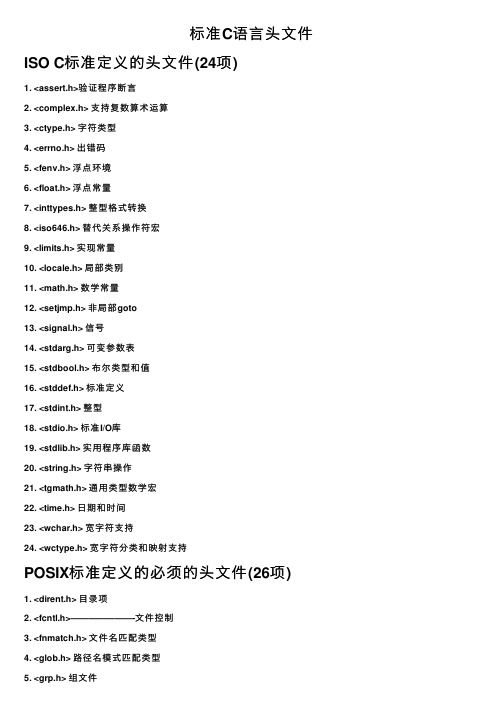
标准C语⾔头⽂件ISO C标准定义的头⽂件(24项)1. <assert.h>验证程序断⾔2. <complex.h> ⽀持复数算术运算3. <ctype.h> 字符类型4. <errno.h> 出错码5. <fenv.h> 浮点环境6. <float.h> 浮点常量7. <inttypes.h> 整型格式转换8. <iso646.h> 替代关系操作符宏9. <limits.h> 实现常量10. <locale.h> 局部类别11. <math.h> 数学常量12. <setjmp.h> ⾮局部goto13. <signal.h> 信号14. <stdarg.h> 可变参数表15. <stdbool.h> 布尔类型和值16. <stddef.h> 标准定义17. <stdint.h> 整型18. <stdio.h> 标准I/O库19. <stdlib.h> 实⽤程序库函数20. <string.h> 字符串操作21. <tgmath.h> 通⽤类型数学宏22. <time.h> ⽇期和时间23. <wchar.h> 宽字符⽀持24. <wctype.h> 宽字符分类和映射⽀持POSIX标准定义的必须的头⽂件(26项)1. <dirent.h> ⽬录项2. <fcntl.h>———————-⽂件控制3. <fnmatch.h> ⽂件名匹配类型4. <glob.h> 路径名模式匹配类型5. <grp.h> 组⽂件6. <netdb.h> ⽹络数据库操作7. <pwd.h> ⼝令⽂件8. <regex.h> 正则表达式9. <tar.h> tar归档值10. <termios.h> 终端I/O11. <unistd.h> 符号常量12. <utime.h> ———————-⽂件时间13. <wordexp.h> 字扩展类型14. <arpa/inet.h> Internet定义15. <net/if.h> 套接字本地接⼝16. <netinet/in.h> Internet地址族17. <netinet/tcp.h>———————-传输控制协议定义18. <sys/mman.h> 内存管理声明19. <sys/select.h> select函数20. <sys/socket.h> 套接字接⼝21. <sys/stat.h> ⽂件状态22. <sys/times.h> ———————-进程时间23. <sys/types.h> 基本系统数据类型24. <sys/un.h> UNIX域套接字定义25. <sys/utsname.h>系统名26. lt;sys/wait.h> 进程控制POSIX标准定义的XSI扩展头⽂件(26项)1. <cpio.h> cpio归档值2. <dlfcn.h>———————-动态链接3. <fmtmsg.h> 消息显⽰结构4. <ftw.h> ⽂件树漫游5. <iconv.h> 代码集转换实⽤程序6. <langinfo.h> 语⾔信息常量7. <libgen.h> ———————-模式匹配函数定义8. <monetary.h> 货币类型9. <ndbm.h> 数据库操作10. <nl_types.h> 消息类别11. <poll.h> 轮询函数12. <search.h> 搜索表13. <strings.h>———————-字符串操作14. <syslog.h> 系统出错⽇志记录15. <ucontext.h> ⽤户上下⽂16. <ulimit.h> ⽤户限制17. <utmpx.h> ⽤户帐户数据库18. <sys/ipc.h> IPC19. <sys/msg.h>———————-消息队列20. <sys/resource.h> 资源操作21. <sys/sem.h> 信号量22. <sys/shm.h> 共享存储23. <sys/statvfs.h> ⽂件系统信息24. <sys/time.h> 时间类型25. <sys/timeb.h>———————-附加的⽇期和时间定义26. <sys/uio.h> ⽮量I/O操作POSIX标准定义的可选头⽂件(8项)1. <aio.h> 异步I/O2. <mqueue.h> ———————-消息队列3. <pthread.h> 线程4. <sched.h> 执⾏调度5. <semaphore.h> 信号量6. <spawn.h> 实时spawn接⼝7. <stropts.h> XSI STREAMS接⼝8. <trace.h> 时间跟踪1.。
C语言头文件大全
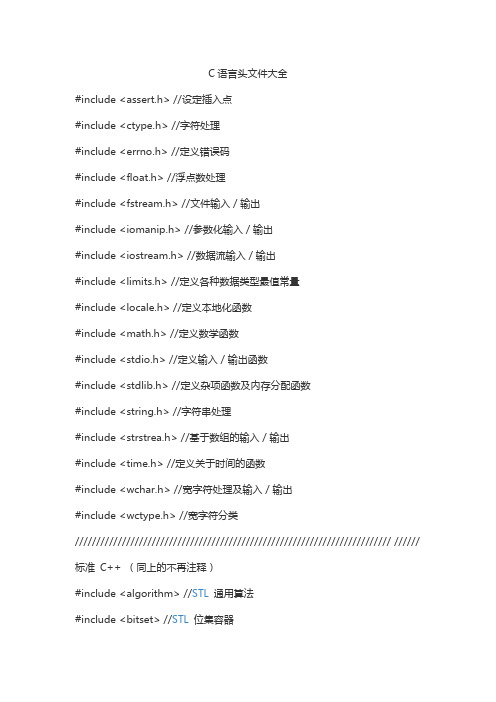
C语言头文件大全#include <assert.h> //设定插入点#include <ctype.h> //字符处理#include <errno.h> //定义错误码#include <float.h> //浮点数处理#include <fstream.h> //文件输入/输出#include <iomanip.h> //参数化输入/输出#include <iostream.h> //数据流输入/输出#include <limits.h> //定义各种数据类型最值常量#include <locale.h> //定义本地化函数#include <math.h> //定义数学函数#include <stdio.h> //定义输入/输出函数#include <stdlib.h> //定义杂项函数及内存分配函数#include <string.h> //字符串处理#include <strstrea.h> //基于数组的输入/输出#include <time.h> //定义关于时间的函数#include <wchar.h> //宽字符处理及输入/输出#include <wctype.h> //宽字符分类////////////////////////////////////////////////////////////////////////// ////// 标准C++ (同上的不再注释)#include <algorithm> //STL通用算法#include <bitset> //STL位集容器#include <cctype>#include <cerrno>#include <clocale>#include <cmath>#include <complex> //复数类#include <cstdio>#include <cstdlib>#include <cstring>#include <ctime>#include <deque> //STL双端队列容器#include <exception> //异常处理类#include <fstream>#include <functional> //STL 定义运算函数(代替运算符)#include <limits>#include <list> //STL 线性列表容器#include <map> //STL 映射容器#include <iomanip>#include <ios> //基本输入/输出支持#include <iosfwd> //输入/输出系统使用的前置声明#include <iostream>#include <istream> //基本输入流#include <ostream> //基本输出流#include <queue> //STL 队列容器#include <set> //STL 集合容器#include <sstream> //基于字符串的流#include <stack> //STL 堆栈容器#include <stdexcept> //标准异常类#include <streambuf> //底层输入/输出支持#include <string> //字符串类#include <utility> //STL 通用模板类#include <vector> //STL 动态数组容器#include <cwchar>#include <cwctype>////////////////////////////////////////////////////////////////////////// ////// #include <complex.h> //复数处理#include <fenv.h> //浮点环境#include <inttypes.h> //整数格式转换#include <stdbool.h> //布尔环境#include <stdint.h> //整型环境#include <tgmath.h> //通用类型数学宏#include<conio.h> //说明调用DOS控制台I/O子程序的各个函数。
C语言常见头文件汇总

C语言常见头文件汇总C语言是一种广泛应用的编程语言,在学习和使用C语言时,我们通常会使用一些常见的头文件来调用各种函数和实现一些功能。
以下是一些常见的C语言头文件及其功能的汇总:1. stdio.h:提供了一些输入输出相关的函数,如printf、scanf等。
它是C语言中最常见的、最基础的头文件之一2. math.h:提供了数学运算相关的函数,如sin、cos、sqrt等。
3. string.h:提供了一些字符串操作相关的函数,如strcpy、strcat、strlen等。
4. stdlib.h:提供了一些通用的函数,如malloc、free、rand等。
5. ctype.h:提供了一些用于字符处理的函数,如isalnum、isalpha、tolower等。
6. stdbool.h:定义了bool类型及其取值true和false。
8. assert.h:提供了一些断言相关的函数,如assert。
9. limits.h:定义了一些与整数类型相关的宏,如INT_MAX、INT_MIN等。
10. float.h:定义了一些与浮点数类型相关的宏,如FLT_MAX、FLT_MIN等。
11. errno.h:定义了一些与错误码相关的宏和函数,如errno、perror等。
12. fcntl.h:定义了一些与文件控制相关的宏和函数,如open、close等。
13. signal.h:定义了一些与信号处理相关的宏和函数,如signal、kill等。
14. setjmp.h:定义了一些与非局部跳转相关的宏和函数,如setjmp、longjmp等。
15. locale.h:定义了一些与本地化相关的宏和函数,如setlocale、localeconv等。
16. stdarg.h:定义了一些用于可变参数函数的宏和函数,如va_list、va_start、va_arg等。
17. ctype.h:定义了一些字符分类函数,如isalpha、isdigit等。
C语言头文件大全
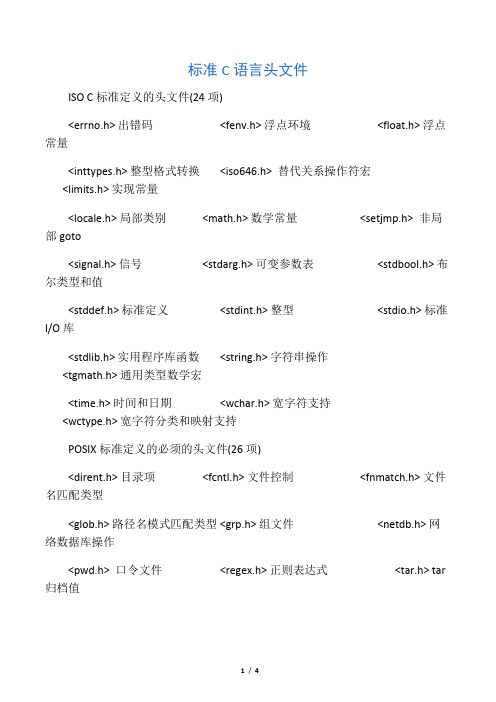
标准C语言头文件ISO C标准定义的头文件(24项)<errno.h> 出错码<fenv.h> 浮点环境<float.h> 浮点常量<inttypes.h> 整型格式转换<iso646.h> 替代关系操作符宏<limits.h> 实现常量<locale.h> 局部类别<math.h> 数学常量<setjmp.h> 非局部goto<signal.h> 信号<stdarg.h> 可变参数表<stdbool.h> 布尔类型和值<stddef.h> 标准定义<stdint.h> 整型<stdio.h> 标准I/O库<stdlib.h> 实用程序库函数<string.h> 字符串操作<tgmath.h> 通用类型数学宏<time.h> 时间和日期<wchar.h> 宽字符支持<wctype.h> 宽字符分类和映射支持POSIX标准定义的必须的头文件(26项)<dirent.h> 目录项<fcntl.h> 文件控制<fnmatch.h> 文件名匹配类型<glob.h> 路径名模式匹配类型 <grp.h> 组文件<netdb.h> 网络数据库操作<pwd.h> 口令文件<regex.h> 正则表达式<tar.h> tar 归档值<termios.h> 终端I/O <unistd.h> 符号常量<utime.h> 文件时间<wordexp.h> 字扩展类型<arpa/inet.h> Internet定义<net/if.h> 套接字本地接口<netinet/in.h> Internet地址族<netinet/tcp.h> 传输控制协议<sys/mman.h> 内存管理声明<sys/select.h> select函数<sys/socket.h> 套接字接口<sys/stat.h> 文件状态<sys/times.h> 进程时间<sys/types.h> 基本系统数据类型<sys/un.h> UNIX域套接字定义<sys/utsname.h>系统名<sys/wait.h> 进程控制POSIX标准定义的XSI扩展头文件(26项)<cpio.h> cpio归档值<dlfcn.h> 动态链接<fmtmsg.h> 消息显示结构<ftw.h> 文件树漫游<iconv.h> 代码集转换实用程序<langinfo.h> 语言信息常量<libgen.h> 模式匹配函数定义<monetary.h> 货币类型<ndbm.h> 数据库操作<nl_types.h> 消息类别<poll.h> 轮询函数<search.h> 搜索表<strings.h> 字符串操作<syslog.h> 系统出错日志记录<ucontext.h> 用户上下文<ulimit.h> 用户限制<utmpx.h> 用户帐户数据库<sys/ipc.h> IPC<sys/msg.h> 消息队列<sys/resource.h> 资源操作<sys/sem.h> 信号量<sys/shm.h> 共享存储<sys/statvfs.h> 文件系统信息<sys/time.h> 时间类型<sys/timeb.h> 附加的时间<sys/uio.h> 矢量I/O操作POSIX标准定义的可选头文件(8项)<aio.h> 异步I/O <mqueue.h> 消息队列<pthread.h> 线程<sched.h> 执行调度<semaphore.h> 信号量<spawn.h> 实时spawn接口<stropts.h> XSI STREAMS接口<trace.h> 时间跟踪标准C++ 语言头文件(54个其中16个用于构建STL,3个为附加非必须)<algorithm>STL通用算法<bitset> STL位集容器<cassert> 用于在程序运行时执行断言<cctype> 字符处理<cerrno> 错误码<cfloat> 用于测试浮点类型属性<ciso646> ISO646变体字符集<climits> 测试整数类型属性<clocale> 本地化函数<csignal> 信号<cstdarg> 访问参数数量变化的函数<cstddef> 用于定义实用的类型和宏<cstdio> 输入/输出<cstdlib> 杂项函数及内存分配<cstring> 字符串<ctime> 时间<cwchar> 宽字符处理及输入/输出<cwctype> 宽字符分类<deque> STL双端队列容器<exception> 异常处理类<fstream> 文件流<functional> STL函数对象<iomanip> 参数化输入/输出<ios>基本输入/输出支持<iosfwd> 输入/输出前置声明<iostream> 数据流输入/输出<istream> 基本输入流<iterator> 遍历序列的类<limits> 各种数据类型最值常量<list> STL线性列表容器<locale> 国际化支持<map> STL映射容器<memory> 专用内存分配器<new> 基本内存分配和释放<numeric> 通用的数字操作<ostream> 基本输出流<queue> STL 队列容器<set> STL 集合容器<sstream> 基于字符串的流<stack> STL 堆栈容器<stdexcept> 标准异常类<streambuf> iostream 的缓冲区类<string> 字符串类<strstream> 非内存字符序列的流类<typeinfo> 运行时类型标识<utility> STL 通用模板类<valarray> 支持值数组的类和模版类<vector> STL 动态数组容器标准C++附加的头文件(3个)非必须<hash_map> <hash_set> <slist>。
- 1、下载文档前请自行甄别文档内容的完整性,平台不提供额外的编辑、内容补充、找答案等附加服务。
- 2、"仅部分预览"的文档,不可在线预览部分如存在完整性等问题,可反馈申请退款(可完整预览的文档不适用该条件!)。
- 3、如文档侵犯您的权益,请联系客服反馈,我们会尽快为您处理(人工客服工作时间:9:00-18:30)。
无疑, 在例程-5 中的 second.h 和 first.h 中,需要我们用 extern 标志符来 修饰 play1 函数的声明,这样,play1()函数就可以被导出到连接程序, 也就是实 现了无论在 first.c 文件中调用,还是在 second.c 文件中调用,连接程序都会很聪 明的按照我们的意愿,把他连接到 first.c 文件中的 play1 函数的定义上去, 而不 必我们在 second.c 文件中也要再写一个一样的 play1 函数. 但随之有一个小问题, 在例程-5 中,我们并没有用 extern 标志符来修饰 play1 啊, 这里涉及到另一个问题, C 语言中有默认的存储类标志符. C99 中规 定, 所有顶层的默认存储类标志符都是 extern . 原来如此啊, 哈哈. 回想一下 例程-4, 也是好险, 我们在无知的情况下, 竟然也误打误撞,用到了 extern 修饰 符, 否则在 first.h 中声明的 play1 函数如果不被连接程序导出,那么我们在在 play2()中调用他时, 是找不到其实际定义位置的 . 那么我们如何来区分哪个头文件中的声明在其对应的.c 文件中有定义,而哪 个又没有呢?这也许不是必须的,因为无论在哪个文件中定义,聪明的连接程序 都会义无返顾的帮我们找到,并导出到连接程序, 但我觉得他确实必要的. 因为 我们需要知道这个函数的具体内容是什么,有什么功能, 有了新需求后我也许要 修改他, 我需要在短时间内能找到这个函数的定义, 那么我来介绍一下在 C 语言 中一个人为的规范:
PDF 文件使用 "pdfFactory" 试用版本创建 ÿ
play2(); play2() { ………………. play1(); ……………….. } play1() { ……………………. play2(); …………………… } main() { play1(); } 例程-4 经历了我的半天的唠叨, 加上四个例程的说明,我们终于开始了用量变引起 的质变, 这篇文章的主题.h 文件快要出现了。 一个大型的软件项目,可能有几千个,上万个 play, 而不只是 play1,play2 这么简单, 这样就可能有 N 个类似 play1(); play2(); 这样的声明, 这个时候 就需要我们想办法把这样的 play1(); play2(); 也另行管理, 而不是把他放 在.c 文件中, 于是.h 文件出现了. 文件名 First.h play1(); play2(); 文件名 First.C #include “first.h” play2() { ………………. play1(); ……………….. } play1(); { …………………….. play2(); …………………… } main()
上面洋洋洒洒写了那么多都是针对函数的, 而实际上.h 文件却不是为函数所 御用的. 打开我们项目的一个.h 文件我们发现除了函数外,还有其他的东西, 那 就是全局变量.
PDF 文件使用 "pdfFactory" 试用版本创建 ÿ
在大型项目中,对全局变量的使用不可避免, 比如,在 first.c 中需要使用一 个全局变量 G_test, 那么我们可以在 first.h 中,定义 TPYE G_test. 与对函数 的使用类似, 在 second.c 中我们的开发人员发现他也需要使用这个全局变量, 而且要与 first.c 中一样的那个, 如何处理? 对,我们可以仿照函数中的处理方法, 在 second.h 中再次声明 TPYE G_test, 根据 extern 的用法,以及 c 语言中默 认的存储类型, 在两个头文件中声明的 TPYE G_test,其实其存储类型都是 extern, 也就是说不必我们操心, 连接程序会帮助我们处理一切. 但我们又如 何区分全局变量哪个是定义声明,哪个是引用声明呢?这个比函数要复杂一些, 一般在 C 语言中有如下几种模型来区分: 1、初始化语句模型 顶层声明中,存在初始化语句是,表示这个声明是定义声明,其他声明是引用声 明。C 语言的所有文件之中,只能有一个定义声明。 按照这个模型,我们可以在 first.h 中定义如下 TPYE G_test=1;那么就确定 在 first 中的是定义声明,在其他的所有声明都是引用声明。 2、省略存储类型说明 在这个模型中, 所有引用声明要显示的包括存储类 extern, 而每个外部变量的 唯一定义声明中省略存储类说明符。 这个与我们对函数的处理方法类似,不再举例说明。 这里还有一个需要说明,本来与本文并不十分相关,但前一段有个朋友遇到 此问题,相信很多人都会遇到,那就是数组全局变量。 他遇到的问题如下: 在声明定义时,定义数组如下: int G_glob[100]; 在另一个文件中引用声明如下: int * G_glob; 在 vc 中,是可以编译通过的,这种情况大家都比较模糊并且需要注意,数 组与指针类似, 但并不等于说对数组的声明起变量就是指针。上面所说的的程序 在运行时发现了问题, 在引用声明的那个文件中,使用这个指针时总是提示内存 访问错误,原来我们的连接程序并不把指针与数组等同,连接时,也不把他们当 做同一个定义,而是认为是不相关的两个定义,当然会出现错误。正确的使用方 法是在引用声明中声明如下: int G_glob[100]; 并且最好再加上一个 extern,更加明了。 extern int G_glob[100];
PDF 文件使用 "pdfFactory" 试用版本创建 ÿ
printStr() { printf(“Hello world!”); } 例程-3 等等, 不就是改变了个顺序嘛, 但结果确是十分不同的. 让我们编译一下例程-2 和例程-3,你会发现例程-3 是编译不过的.这时需要我们来认识一下另一个 C 语 言中的概念:作用域. 我们在这里只讲述与.h 文件相关的顶层作用域, 顶层作用域就是从声明点 延伸到源程序文本结束, 就 printStr()这个函数来说,他没有单独的声明,只有 定义,那么就从他定义的行开始,到 first.c 文件结束, 也就是说,在在例程-2 的 main()函数的引用点上,已经是他的作用域. 例程-3 的 main()函数的引用点 上,还不是他的作用域,所以会编译出错. 这种情况怎么办呢? 有两种方法 ,一 个就是让我们回到例程-2, 顺序对我们来说没什么, 谁先谁后不一样呢,只要能 编译通过,程序能运行, 就让 main()文件总是放到最后吧. 那就让我们来看另一 个例程,让我们看看这个方法是不是在任何时候都会起作用. 文件名 First.c play2() { ………………. play1(); ……………….. } play1(){ …………….. play2(); …………………… } main() { play1(); } 例程-4 也许大部分都会看出来了, 这就是经常用到的一种算法, 函数嵌套, 那么让 我们看看, play1 和 play2 这两个函数哪个放到前面呢? 这时就需要我们来使用第二种方法,使用声明. 文件名 First.c play1();
例程-5
在 second.h 文件内声明 play1 函数,怎么能调用到 first.c 文件中的哪个 play1 函数中呢? 是不是搞错了,没有搞错, 这里涉及到 c 语言的另一个特性: 存储类说明符. C 语言的存储类说明符有以下几个, 我来列表说明一下
说明符 被允许, 表示变量具有本地生存期. 出现在顶层或块的外部变量函数与变量声明中,表示声明的对象具有 静态生存期, 连接程序知道其名字.
在 C 语言家族程序中,头文件被大量使用。一般而言,每个 C++/C 程序通常由头 文件(header files)和定义文件(definition files)组成。头文件作为一种包含 功能函数、数据接口声明的载体文件,用于保存程序的声明(declaration),而 定义文件用于保存程序的实现 (implementation)。 C++/C 程序的头文件以“.h”为后缀。 以下是假设名称为 graphics.h 的头文件: #ifndef GRAPHICS_H (作用:防止 graphics.h 被重复引用) #define GRAPHICS_H #include.... (作用:引用标准库的头文件) ... #include... (作用:引用非标准库的头文件) ... void Function1(...); (作用:全局函数声明) ... class Box (作用:类结构声明) { ... }; #endif 从以上例子可以看出,头文件一般由三部分内容组成:(1)头文件开头处的版权 和版本声明;(2)预处理块;(3)函数和类结构声明等。在头文件中,用 ifndef/define/endif 结构产生预处理块,用 #include 格式来引用库的头文 件。头文件的这种结构,是利用 C 语言进行开发软件所通常具备的,属于公有知 识。 一般在一个应用开发体系中, 功能的真正逻辑实现是以硬件层为基础,在驱动程 序、功能层程序以及用户的应用程序中完成的。根据以上示例,可以发现头文件 的主要作用在于调用库功能, 对各个被调用函数给出一个描述,其本身不包含程 序的逻辑实现代码, 它只起描述性作用,告诉应用程序通过相应途径寻找相应功 能函数的真正逻辑实现代码。 用户程序只需要按照头文件中的接口声明来调用库 功能,编译器会从库中提取相应的代码。
PDF 文件使用 "pdfFactory" 试用版本创建 ÿ
{ play1(); } 例程-4 各位有可能会说,这位 janders 大虾也太罗嗦了,上面这些我也知道, 你还 讲了这么半天, 请原谅, 如果说上面的内容 80%的人都知道的话,那么我保证, 下面的内容,80%的人都不完全知道. 而且这也是我讲述一件事的一贯作风,我 总是想把一个东西说明白,让那些刚刚接触 C 的人也一样明白. 上面是.h 文件的最基本的功能, 那么.h 文件还有什么别的功能呢? 让我来 描述一下我手头的一个项目吧. 这个项目已经做了有 10 年以上了,具体多少年我们部门的人谁都说不太准 确,况且时间并不是最主要的,不再详查了。是一个通讯设备的前台软件, 源文 件大小共 51.6M, 大小共 1601 个文件, 编译后大约 10M, 其庞大可想而 知, 在这里充斥着错综复杂的调用关系,如在 second.c 中还有一个函数需要调 用 first.c 文件中的 play1 函数, 如何实现呢? Second.h 文件 play1(); second.c 文件 ***() { ……………. Play(); ………………. }
